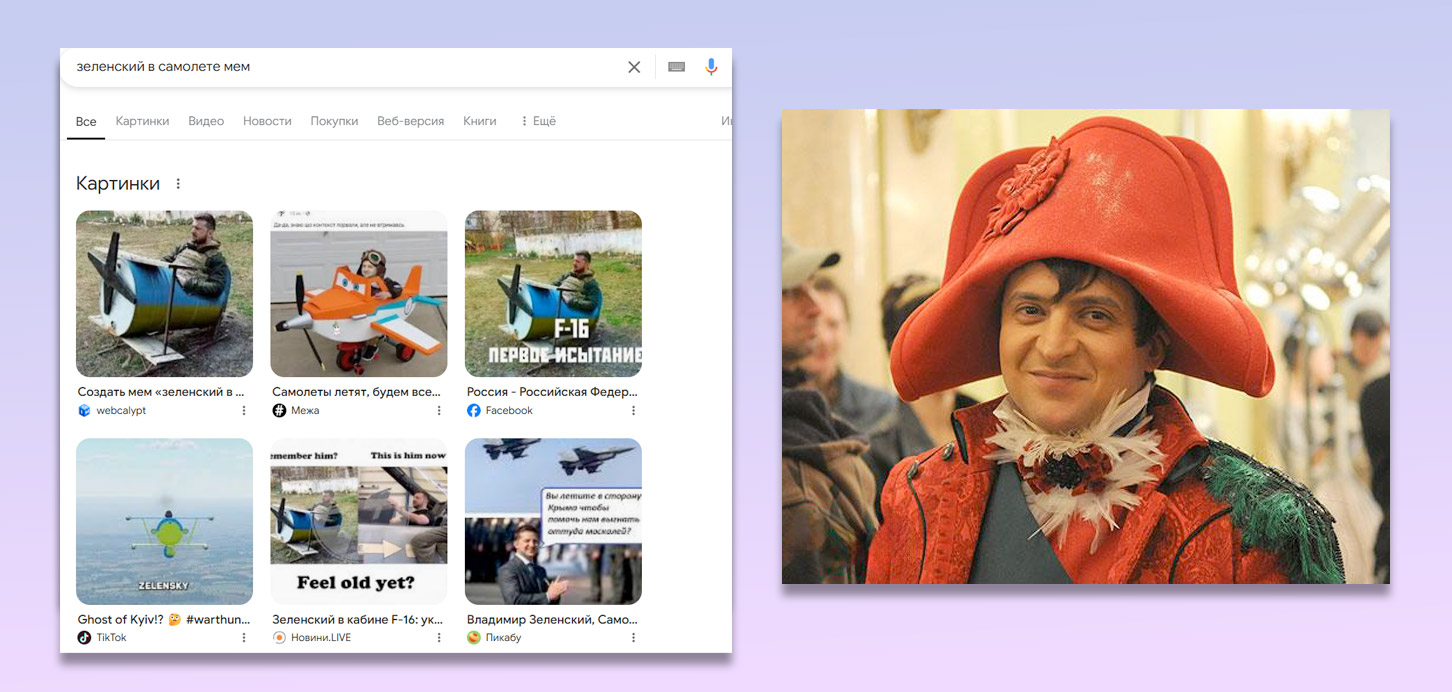
The russian federation has long and systematically worked on inciting anti-Semitic sentiments in Ukraine. Unfortunately, this effort has seen some success, as evidenced by the frequency of Google searches regarding the ethnicity of Ukraine's state and military leadership. It must be said that Ukrainian society itself creates fertile ground for moscow's information PSYOPs.
But more on that later. To start, it’s worth quoting Dmitry Rogozin, the "senator" of the russian federation from the occupied part of the Zaporizhzhia oblast and former head of "Roscosmos". In March of this year, he openly explained to students of the moscow State Institute of International Relations of the russian Ministry of Foreign Affairs the essence and significance of PSYOPs (more on this in the article "What is information warfare and why Ukraine is losing it").
"Victory in war is primarily achieved by discrediting the political and military leadership of the enemy, portraying them in the eyes of their own population as unfit individuals who 'accidentally ended up at the top of power in their country'. These are people who 'drive their population to certain death, to slaughter'. This is a very important method.
The second method of discrediting the military and political leadership of the enemy is accusations of corruption, using a colossal amount of deepfakes to prove that specific individuals are simply thieves and corrupt, and therefore untrustworthy. This is primarily applied to the most popular figures among the enemy population".
Thus, the directions of russian information PSYOPs in Ukraine are outlined: the discrediting of the country’s military and political leadership. This is pursued along two lines: a) Portraying them as "unfit individuals" who "send their population to certain death, to slaughter", b) Accusing them of corruption and theft.
The internet is full of materials supporting these narratives. But how can one measure the effectiveness of moscow's destructive influence on the minds of Ukrainians?
Let us use the big data analysis methodology described in the book "Everybody Lies" by American sociologist Seth Stephens-Davidowitz.
The essence of this methodology lies in the fact that people often lie, even to themselves, let alone to sociologists. We all want to appear better in our own eyes and in the eyes of others than we really are. However, there is no need to pretend or lie to an anonymous and impersonal internet. Therefore, by analyzing people’s online behavior and the content of their search queries, we can determine what they truly think about, what interests them, and what they genuinely desire. This is especially true for topics that are not openly discussed, given the prevailing societal understanding of "norms".
This could include topics like sexual preferences or political views during wartime, when it is expected to be "patriotic". It also applies to questions where honest answers could lead not only to social condemnation but also to repressive actions by authorities.
Stephens-Davidowitz gives the following example: "The Google search engine allowed us to see an America that starkly contrasts with the post-racial utopia portrayed by the results of sociological surveys. I remember the first time I typed the word 'nigger' into Google Trends. You can call me naive, but considering how toxic this word is, I expected the search volume to be very small. Folks, I was wrong. In the United States, the word 'nigger' appeared in search queries roughly as often as the words 'migraine,' 'economists,' and 'Lakers'... What motivation did Americans have for searches involving the word 'nigger'? Only 20% of searches containing the word 'nigger' included the word 'joke', whereas the majority of such searches included phrases like 'stupid niggers' and 'I hate niggers'. And there are millions of such searches annually..."
The author also demonstrates a correlation between actual racist sentiments in the U.S. and the results of the 2016 elections, which completely contradicted sociological polls. One reason he cites for this is that any sociology is limited by the amount of data collected. However, the internet records the behavior of millions of people, significantly expanding the scope for analysis.
Inspired by Stephens-Davidowitz's book, the author of this article conducted several rounds of research into popular Google search queries related to Ukraine's political and military leaders. This represents the most basic interpretation of the American analyst’s methodology, yet it revealed rather unexpected results.
Specifically, I entered a surname or a combination of words with that surname into the search engine and observed the autocomplete suggestions it generated. It is well-known that these suggestions reflect the most popular current queries. For greater relevance, the searches were conducted in both Ukrainian and russian.
The very first round, conducted at the end of November, showed that in the russian-speaking segment, queries like "Zelensky on the plane meme" and "Zelensky meme" were popular, as well as "Zelensky – Napoleon".
Considering the insulting nature of the airplane meme and the frivolous tone of the film "Rzhevsky Versus Napoleon", in which Zelensky starred, it’s clear that moscow aims to portray Ukraine’s president — paraphrasing Dmitry Rogozin — as “an unworthy person who accidentally rose to power”.

Interestingly, within a month, the query about the airplane meme became extremely popular in the Ukrainian segment of the search engine as well. In addition, another campaign to discredit Zelensky emerged — someone revived a 2019 story accusing the then-presidential candidate of being a russian agent with the codename "Buratino". In the russian-speaking segment, little changed over the course of the month.
Systematic efforts to discredit Volodymyr Zelensky were ongoing all this time through the narrative "Zelensky – thief". This is clearly reflected in search queries such as "Zelensky bought…".
Interestingly, among the popular queries about Zelensky, there is no question regarding his nationality. This is likely because this fact is already widely known. However, when it comes to other Ukrainian leaders, it seems the public is not indifferent to their ethnic backgrounds.
This includes the head of the President’s Office, Andriy Yermak.
An explicitly antisemitic insinuation appears in queries about former Commander-in-Chief of the Armed Forces Valerii Zaluzhnyi, specifically the phrase "Zaluzhnyi Zalman", suggesting that "Zalman" is his "real" surname.
Curiously, the discreditation of the current Commander-in-Chief of the Armed Forces, Oleksandr Syrskyi, has been centered on terms like "blockade units" and "butcher". This likely stems from the well-known fact that he is ethnically russian. However, in December, Google users suddenly became interested in his nationality, albeit not as a primary concern.
It is evident that someone is deliberately stirring these sentiments among the masses. And it is equally clear who.
The exploitation of the "Jewish card" by the russian federation in Ukraine became glaringly apparent after putin’s antisemitic remarks during his Direct Line event on December 19. Specifically, he claimed that the ban on the activities of the russian orthodox church in Ukraine was initiated by "ethnic Jews".
"These people who attack the church, they are not atheists; they are completely non-believing, godless people. Well, ethnically, many of them are Jews, but we haven’t seen them attending any synagogues", - stated the leader of the aggressor state.
The President of the Conference of European Rabbis Pinchas Goldschmidt, who served as Moscow’s Chief Rabbi from 1993 to 2022, remarked that "this echoes Stalin’s antisemitic rhetoric during the 'Doctors’ Plot' (1948-53), which led to the arrest and murder of much of the Soviet Union’s Jewish leadership".
In turn, kremlin political strategist Sergey Markov, who influences the formation of russia’s propaganda agenda, commented on putin’s words as follows: "This is what I have repeated many times: Zelensky is preparing Jewish pogroms. It is the duty of all Jewish politicians and public figures to the Jewish people to harshly condemn Zelensky and his primarily Jewish team for dismantling the Orthodox Church in Ukraine. Because right now, the Jew Zelensky and his friends from the CIA are crushing Orthodoxy. But later, all Jews will be blamed for this destruction of Orthodox Christianity, and Jewish pogroms will begin in Ukraine. Innocent peaceful people will suffer, as always. To prevent Jewish pogroms, Jews must explicitly distance themselves from Zelensky and his war against Russian Orthodox Christians".
As we can see, moscow is clearly attempting to use the Jewish ethnicity of Ukraine’s leaders (real or alleged) as a tool to oppose the Orthodox majority in the country and as a pretext for provoking xenophobia and antisemitic actions.
It must be noted that fertile ground for this has already been cultivated. Against the backdrop of the psychological trauma suffered by Ukrainians due to russia’s aggression, there has been a societal legitimization of xenophobia in Ukraine. Various sociological studies indicate that between 30% and 36% of Ukrainians do not wish to engage with people solely because of their nationality, regardless of their personal qualities or even citizenship.
"Of particular concern is the attitude toward Ukrainian citizens of russian ethnicity. Xenophobic attitudes toward them are held by 36% of the population. This attitude is clearly irrational and unjust because sociological research shows that, overall, the views of Ukrainian citizens of russian ethnicity, while slightly different from those of ethnic Ukrainians, do not differ significantly. These citizens are also defending Ukraine against its enemies", - commented the Kyiv International Institute of Sociology in March 2023 regarding its research.
Yes, as of today, the xenophobic sentiments of Ukrainians are directed not at Jews but at ethnic russians (citizens of Ukraine). However, what matters is not the target of xenophobia but the fact that it is considered “normal” by a third of the country’s population.
Since xenophobia is always irrational, the ethnic groups it targets can change. Today, the enemies are russians (both those living in russia and Ukrainian citizens), and tomorrow they could become Jews or other ethnic groups (as has repeatedly occurred in our national history). A lack of tolerance in society leads to internal conflicts. This is understood in russia – and exploited as a weakness of the Ukrainian state against Ukraine.
Xenophobia in Ukraine can be explained by the psychological trauma people have suffered from the war. But it cannot be justified by it. If a mentally ill person kills another, their illness may exempt them from responsibility, but it cannot restore the lost life.
The purpose of the state is precisely to regulate interactions between members of society, not based on emotions and traumas but on the rational maintenance of societal harmony and the country’s development.
Judging by sociological surveys and an analysis of big data on the internet, the Ukrainian state is failing in this task. This will lead to new social upheavals even after the cessation of hostilities with russia. Especially since russia is not going anywhere and will continue to drive wedges into the cracks in Ukraine’s foundation – cracks that we Ukrainians create ourselves…
By Serhiy Harmash, OstroV





